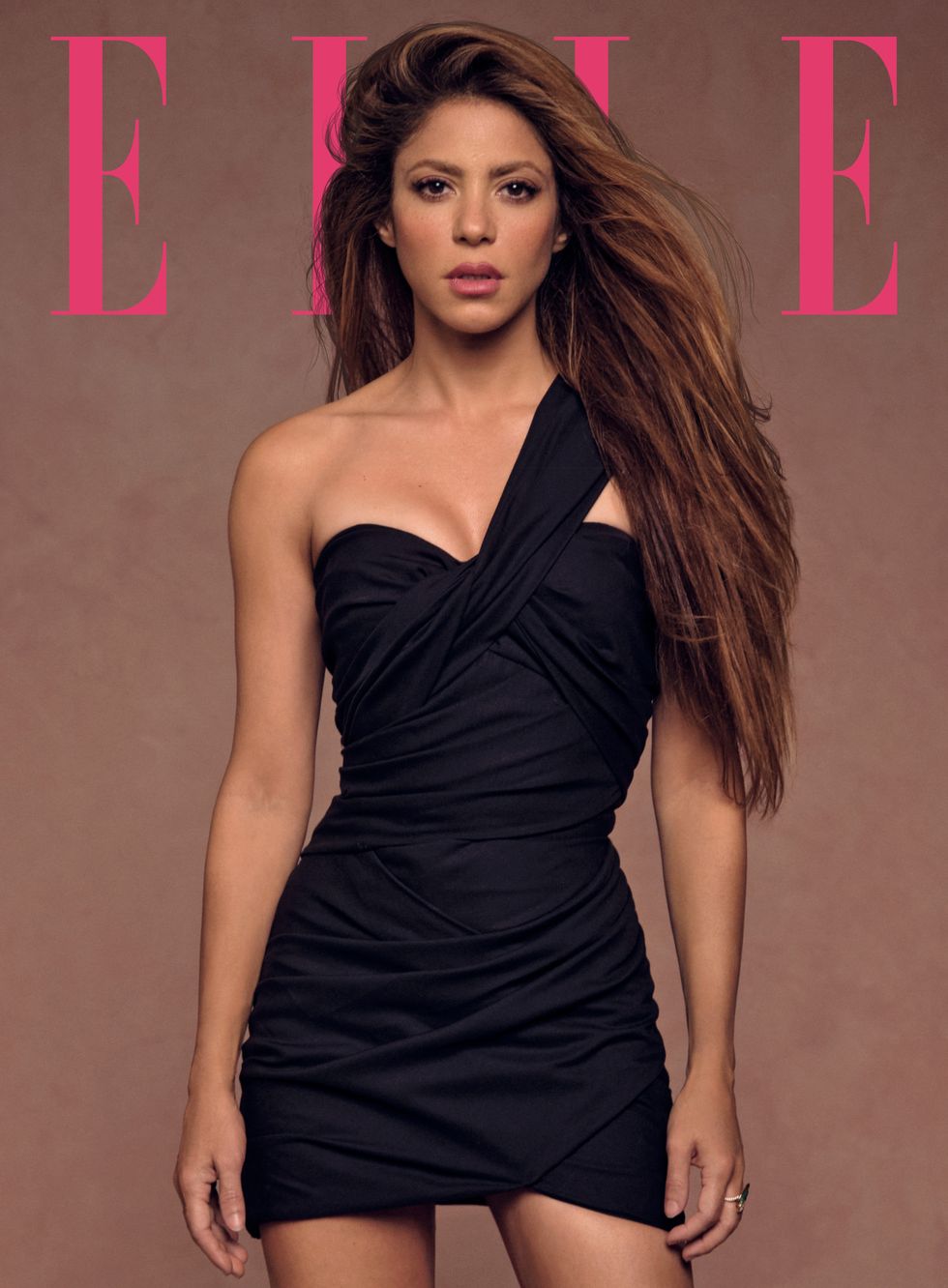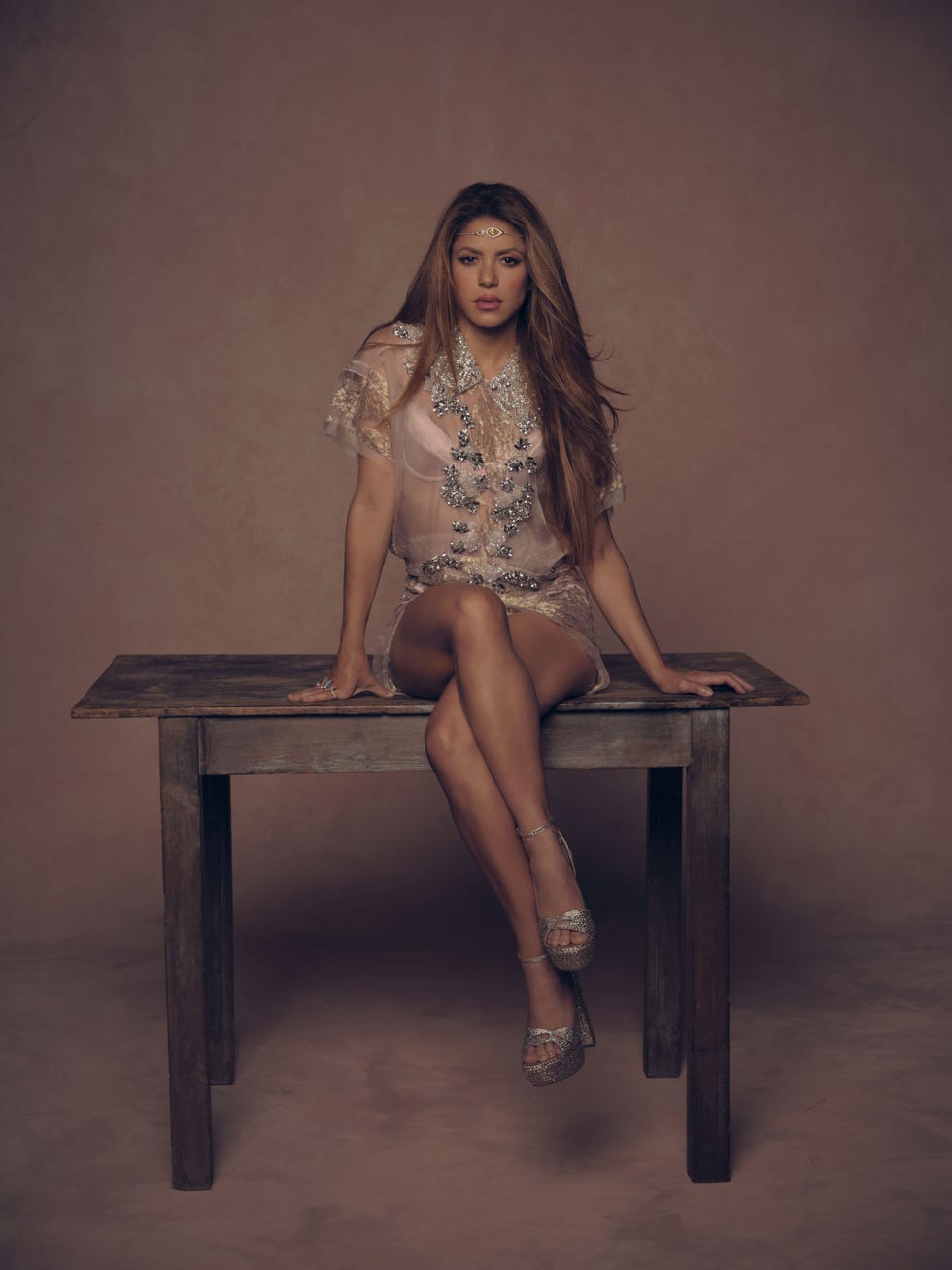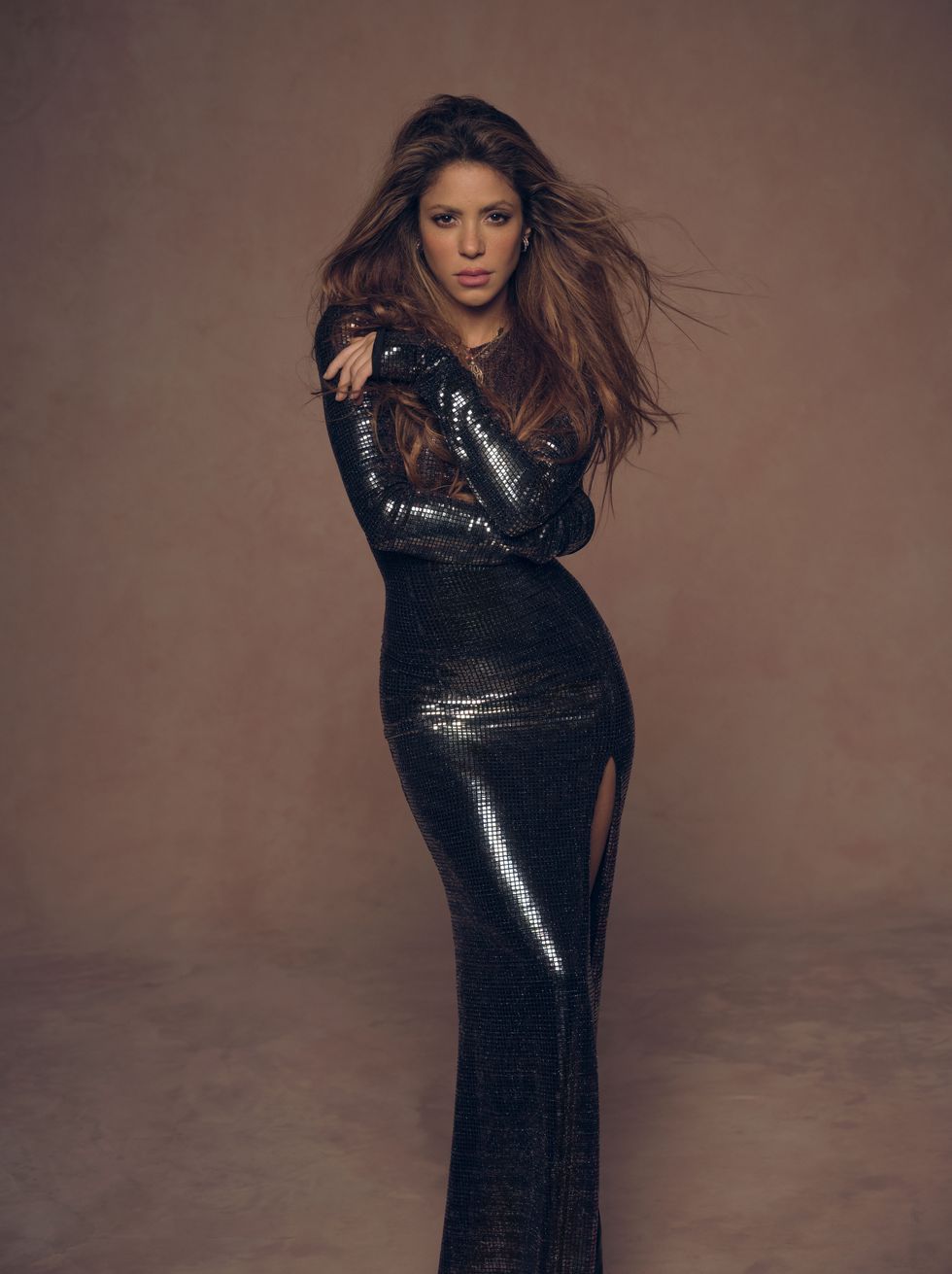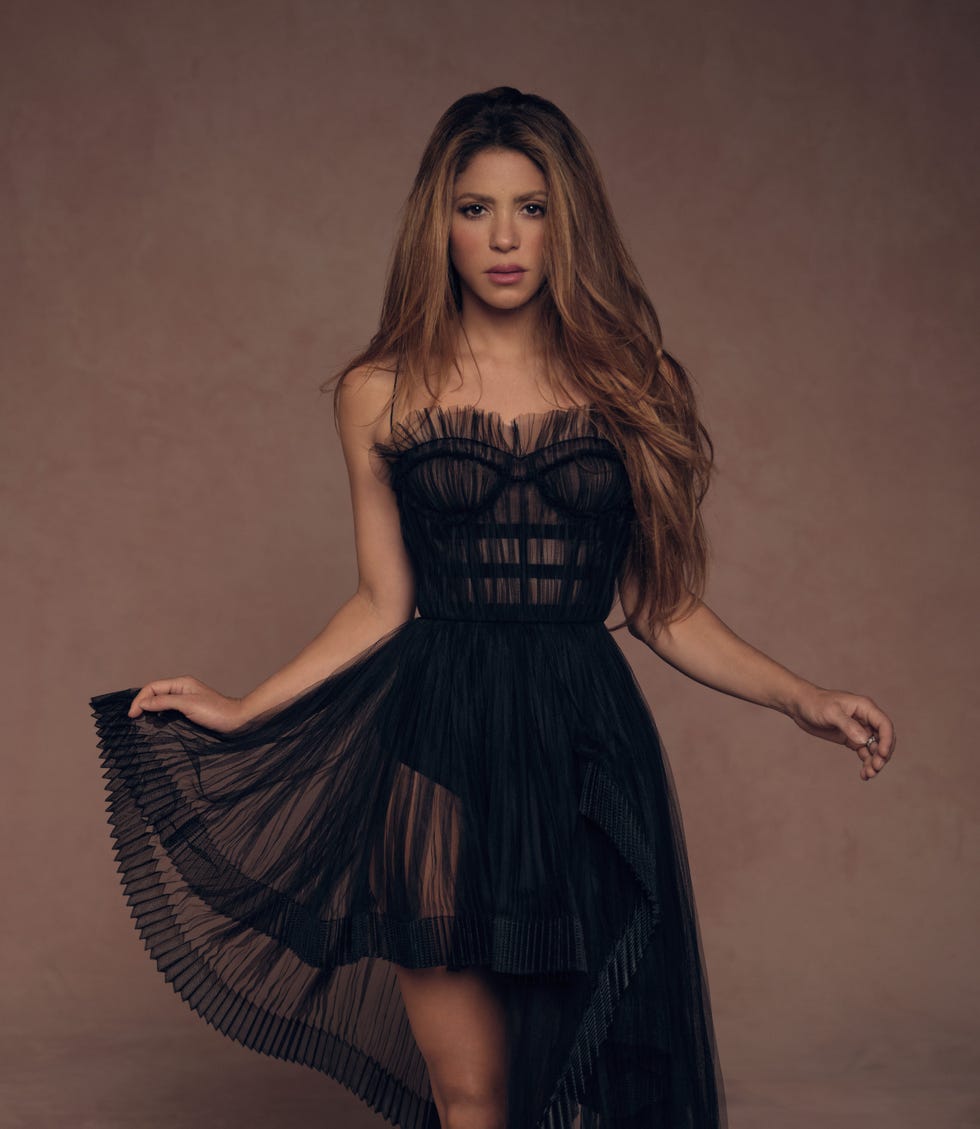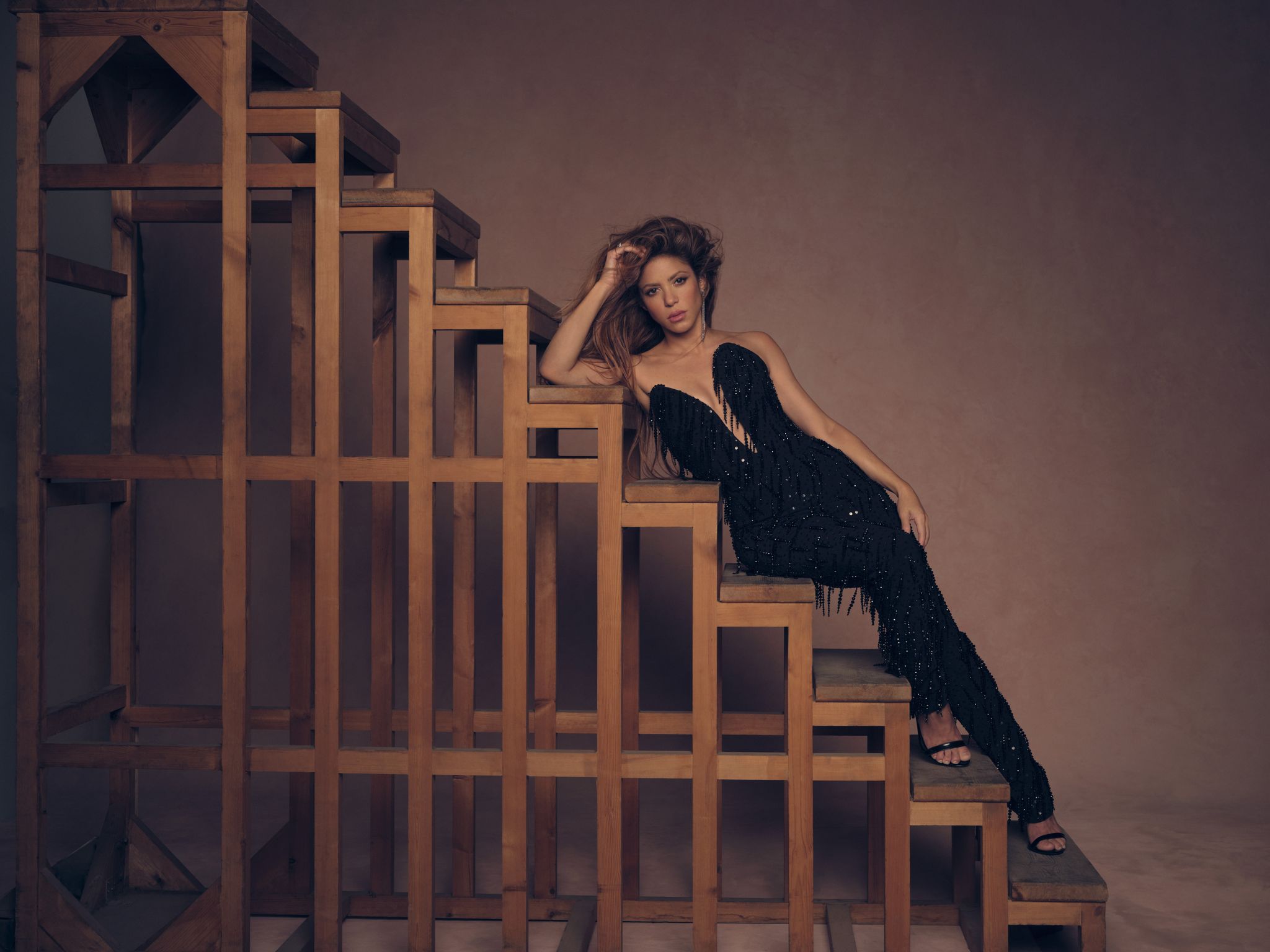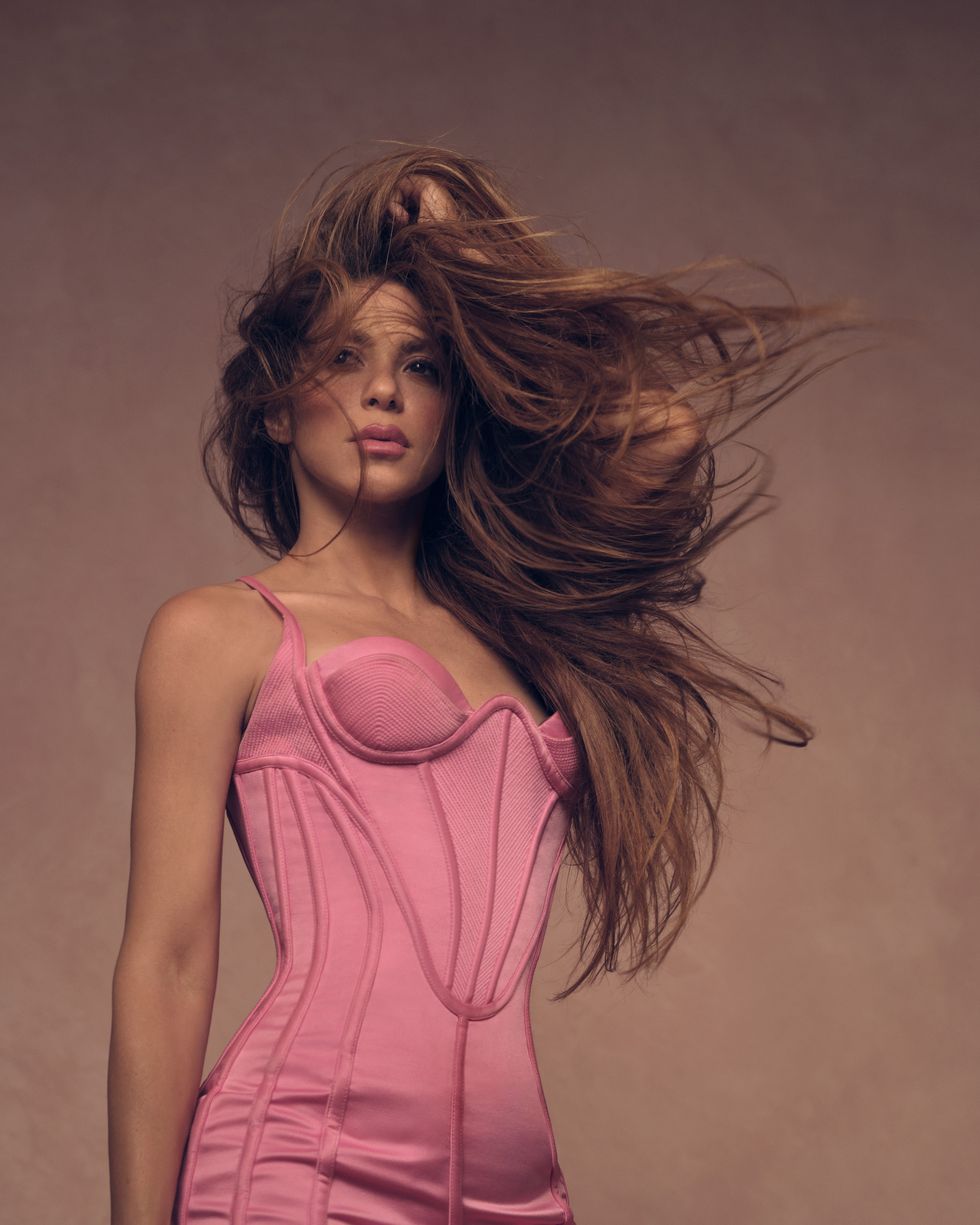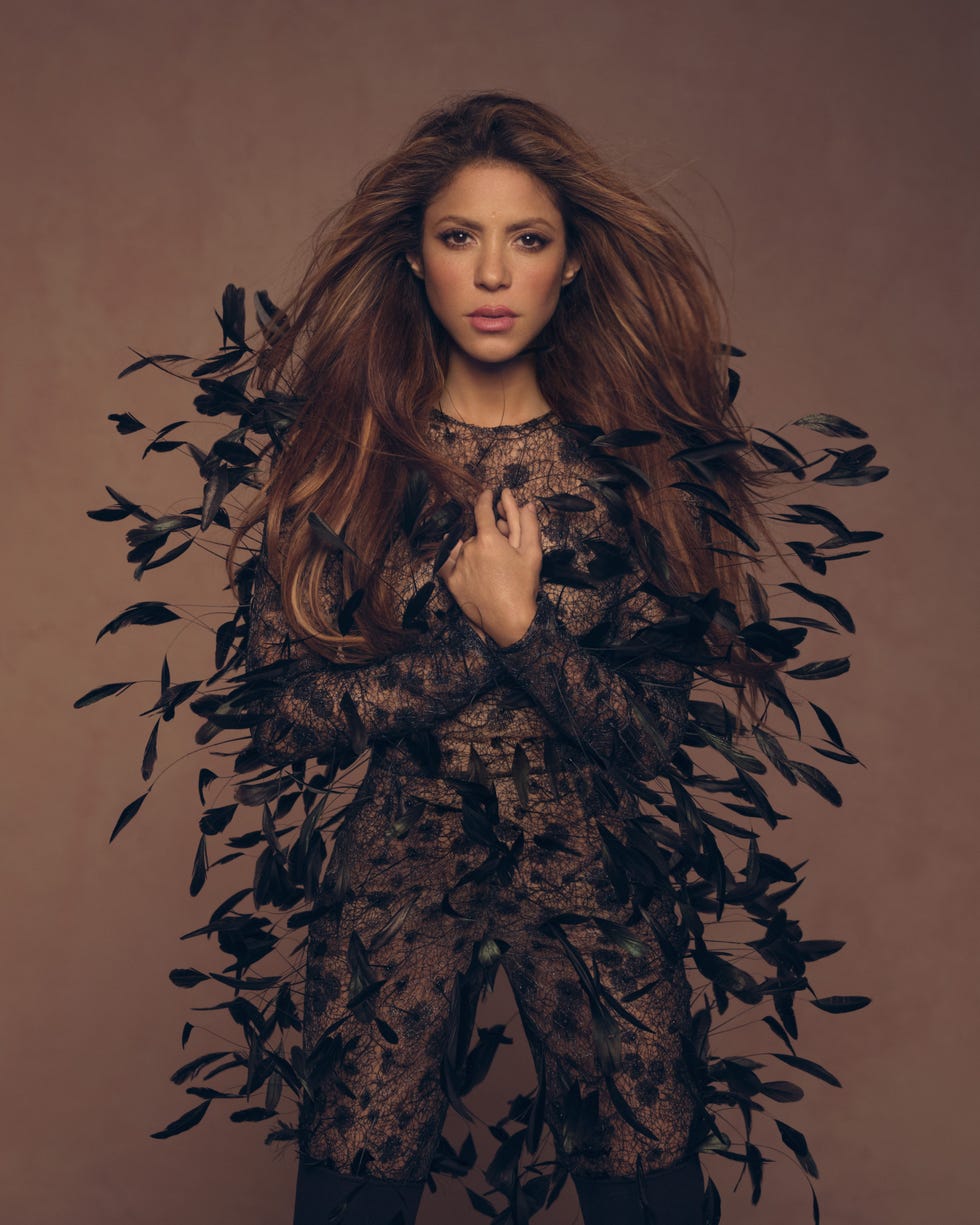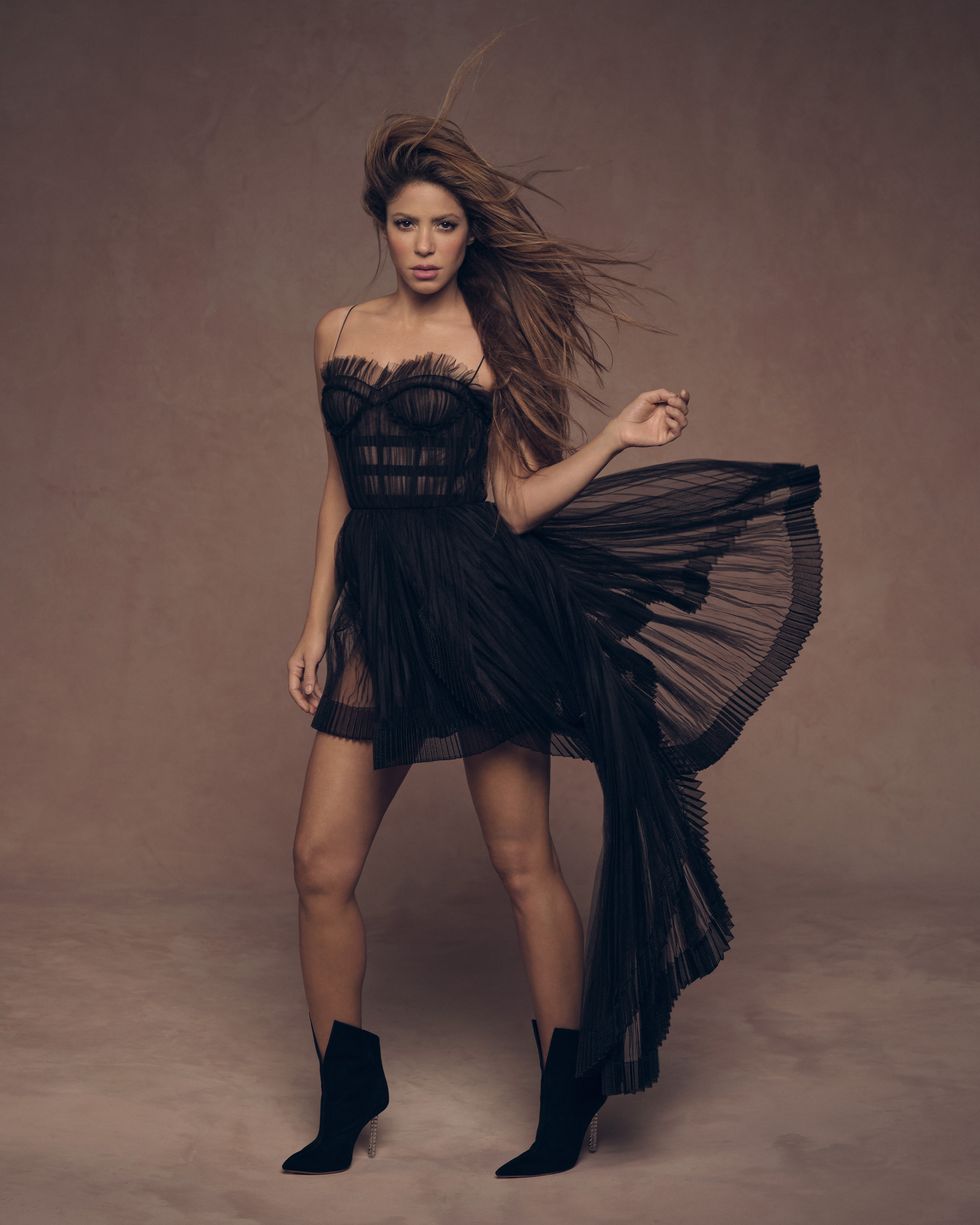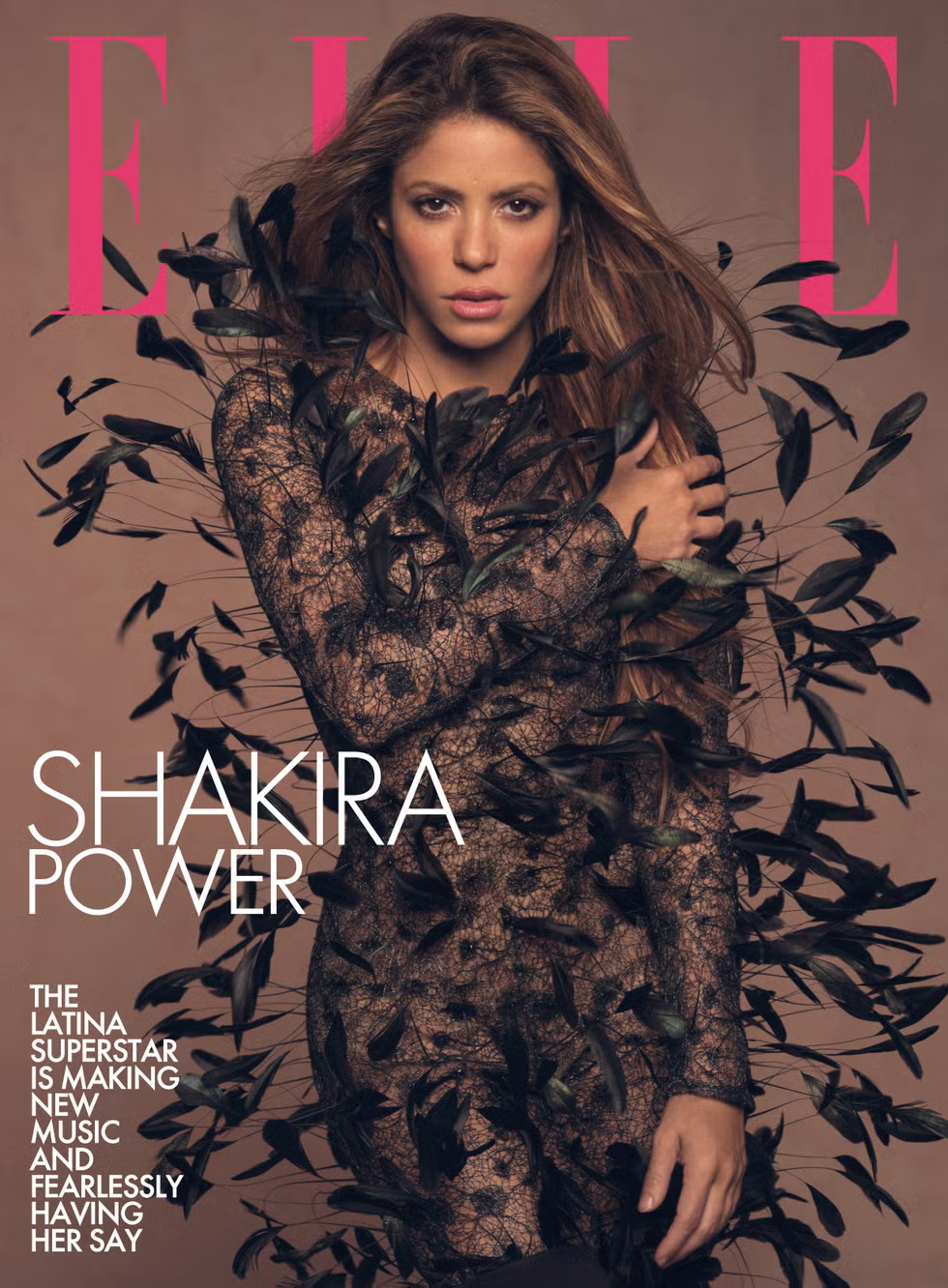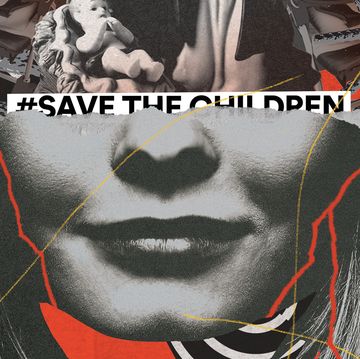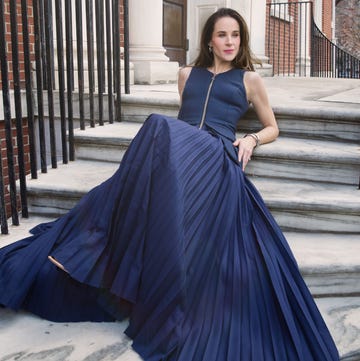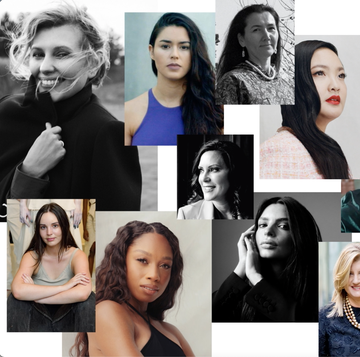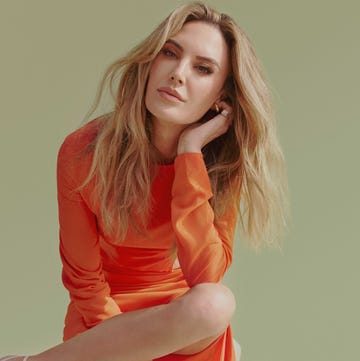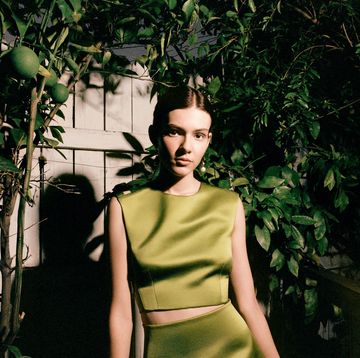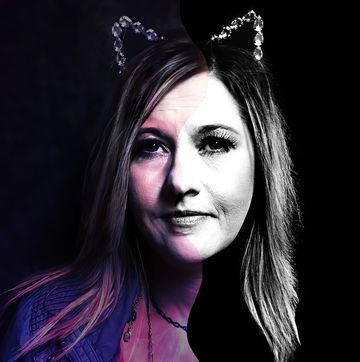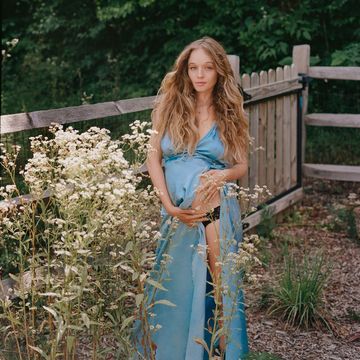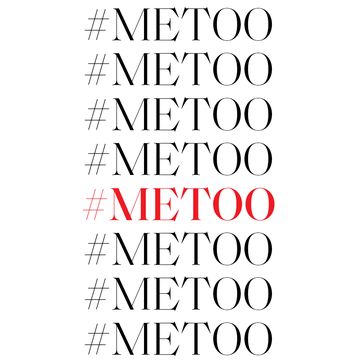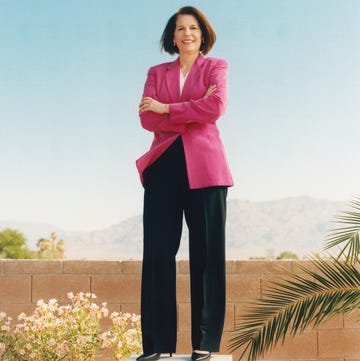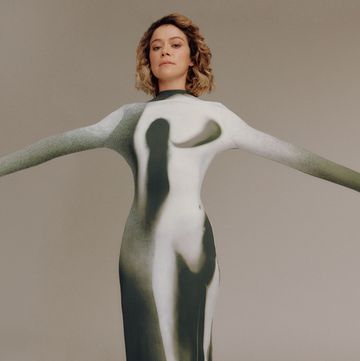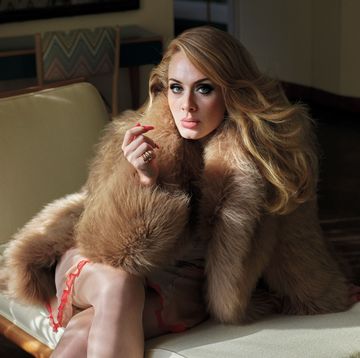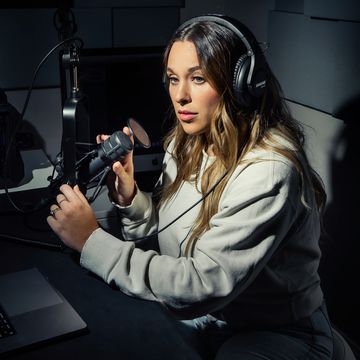Global pop superstar Shakira’s unique blend of Latin pop music infused with the dance moves of her Arabic heritage has blazed a trail in the music industry, bringing joy to millions of her fans around the world and heralding the boom in Latin music. Her stature reached a pinnacle in 2010 when she wrote and performed the theme song for the World Cup in South Africa, where she met and fell in love with Spanish soccer star Gerard Piqué. They eventually settled down together and started a family. In 2013, she told ELLE, “I even had lost my faith for a while...I started to think that there was no God. And suddenly I meet Gerard, and the sun comes out.”
Times have changed. Even though she is preparing to drop her first album in five years, in an exclusive interview with ELLE from her home in Barcelona, she describes the current moment as “her darkest hour.” In June, she announced her split from Piqué, amid a swirl of tabloid headlines, and they have yet to determine custody of their two sons, Milan, 9, and Sasha, 7. She is also headed to a showdown with the Spanish government over accusations that she evaded paying taxes—something she flatly denies. A trial date has not yet been set.
Shakira’s astonishing rise began when she was a teenager in Barranquilla, Colombia, doing gigs in mining towns until, at the age of 14, she heard a music executive was in town and did an impromptu audition. She then taught herself English and ultimately crossed over to U.S. fame in 2001 with her album Laundry Service. Passionately committed to both her charity work in building and running schools in her homeland and her political activism, it’s music, she says, that is now her main inspiration and solace.
She sat down with ELLE to talk publicly for the first time about her long-awaited new music, the collapse of her relationship, and why she’s determined to have her say about her finances.
I just saw you celebrated your dad’s birthday. You serenaded him with a bolero song. It was beautiful. He’s been a key figure in your life, right?
Yeah, he’s my hero. He’s an example of resilience and wisdom. He’s been my best friend, the person I got the best advice from. And, unfortunately, he had a really difficult year. He came to Barcelona when he heard about my family crisis, and he came to give me his support. But then he fell and had a subdural hematoma. And so he had brain surgery. And then a week later, he fell again and broke many bones in his face.
Oh, my goodness.
So it’s been really hard, you know, a hard year for him. But it’s a testament to his strength and his resilience. He still dances when he listens to music. He tries to sing along. And I’ve learned that to seniors, the best gift that you can give them is not only your presence and your company, but also music. When you think about the power that music has, it makes me realize, yeah, my job might not be as heroic as the job of a doctor or a nurse or in the middle of war, but it somehow has a very noble aspect, which is exactly that: to connect people to life.
I do want to ask you about your music, because you have a very eagerly awaited album. You haven’t had an album out since 2017.
Yeah, I have a full album’s worth of music that I’m so excited about. And some songs you’ll hear imminently, some are collaborations. Some are in English and some in Spanish, different genres. But I’m really, really thrilled about not only the body of work that I have right now to share with the people who are waiting for it, but also how gratifying the whole process has been for me. How therapeutic as well. I thought I was done with my album. But every time I get in the studio to do, like, one line or something, or to mix a song that’s almost ready to come out, then I end up with new music because I feel creative right now, and I feel that is an incredible outlet for me to make sense of things.
Tell me a little bit about that process that music is somehow therapy for you when you are going through a hard time. How do you tap into that and use that?
I think everyone has their own processes or their own mechanisms to process grief or stress or anxiety. We all go through stuff in life. But in my case, I think that writing music is like going to the shrink, only cheaper [laughs]. It just helps me process my emotions and make sense of them. And it helps me to heal. I think it’s the best medicine, and along with the love of my family and my kids that sustains me, music and writing music is definitely one of those tools—one of the few tools I have for survival in extreme conditions. It is sort of like driftwood for a man drowning in the sea, that piece of wood that you hang on to when you feel like you’re drowning. I think that music is a life raft. There have been days when I had to pick up the pieces of me from the floor. And the only way to do that, to actually do that, has been through music. You know, to really, like, put myself back together and to see myself in the mirror and know that I am a mom and my kids depend on me.
But also that I have so many things to say. And on those days when I felt that my strength was escaping me, like I didn’t have legs, those days I wrote songs, and I felt like I was revitalized and invigorated after a writing session. It’s like an injection of vitamins [laughs]. Sometimes I dreaded my work so much in the past because I just wanted to be there for my kids. I mean, I just wanted to cuddle with my kids in bed a little bit longer. And then I had to, like, get up and shoot a video and fulfill my obligations. But now I’m so thankful for my work, the possibility that it gives us to put ourselves back together and to realize who we are and why we’re here on this planet—what’s our purpose, our mission. I think you can find that reconstructive power in any kind of work. [In Spanish] El trabajo dignifica el hombre.
It gives dignity to the person.
Exactly. And I feel like in this moment of my life, which is probably one of the most difficult, darkest hours of my life, music has brought light.
I want to talk about this dark moment for you. You’ve used words like “feeling like you’re drowning.” How are you doing with the dissolution of your relationship?
Oh, this is really hard to talk about personally, especially as this is the first time I’ve ever addressed this situation in an interview. I’ve remained quiet and just tried to process it all. Um, and yeah, it’s hard to talk about it, especially because I’m still going through it, and because I’m in the public eye and because our separation is not like a regular separation. And so it’s been tough not only for me, but also for my kids. Incredibly difficult. I have paparazzi camping outside, in front of my house, 24/7. And there’s not a place where I can hide from them with my kids, except for my own house. You know, we can’t take a walk in the park like a regular family or go have an ice cream or do any activity without paparazzi following us. So it’s hard. And I’ve tried to conceal the situation in front of my kids. I try to do it and to protect them, because that’s my number one mission in life. But then they hear things in school from their friends or they come across some disagreeable, unpleasant news online, and it just affects them, you know?
How have they been dealing with it? This must be incredibly difficult for them.
Yeah. I try to conceal the situation from them as much as I can. It’s really upsetting for two kids who are trying to process their parents’ separation. And sometimes I just feel like this is all a bad dream and that I’m going to wake up at some point. But no, it’s real. And what’s also real is the disappointment to see something as sacred and as special as I thought was the relationship I had with my kids’ father and see that turned into something vulgarized and cheapened by the media. And all of this while my dad has been in the ICU and I’ve been fighting on different fronts. Like I said, this is probably the darkest hour of my life. But then I think about all those women around the world who are going through hardship, who are going through a situation as bad as mine or as difficult as mine or worse.
For those women like me who believe in values like family who had the dream, the big dream of having a family forever, to see that dream broken or shredded into pieces is probably one of the most painful things that you can ever go through. But I think that women, we are resilient. You know, we have this resiliency that is just innate in all of us. And we are meant to nurture and to take care of those who depend on us. So you ask me how I manage this. And I just manage, I guess, reminding myself that I need to become an example for my kids, that I need to be what they want, what I want them to become. And I want to be there, also, for all the people who have shown me their love and support. That is my biggest strength. That’s my most powerful engine right now.
It seems like there is at the moment a custody battle with your ex-partner over where the children should be. Is that an accurate reflection of where things are at the moment?
Honestly, the depiction in the local press here in Spain has been so hard to watch. And invasive for my kids. They don’t deserve to feel observed or watched every second, photographed at school drop-off, or followed by paparazzi. They deserve a normal life. It’s just a total circus, and everyone is speculating about all of these aspects of our, and more importantly our children’s, lives, and a lot of it isn’t even true. Regardless of how things ended or how Gerard and I feel about each other as ex-partners, he is the father of my children. We have a job to do for these two incredible boys, and I have faith that we will figure out what is best for their future, their own dreams in life, and what is a fair solution for everyone involved. And I hope and would appreciate if we were given the space to do that privately.
I do want to ask about the dissolution of your relationship. Your ex-partner has been seen in a new relationship. It sounds like you did not want your relationship to end, and it was a surprise to you that the relationship was over. How did you come to understand that you weren’t going to be together anymore?
I think that those details are somehow too private to share, at least at this very moment—everything is so raw and new. I can only say that I put everything I had into this relationship and my family. Before my kids started school, I had a really nomadic life—I had lived my entire existence as an artist, traveling non-stop, going to different places around the world, touring, doing shows, promotion, building schools in Colombia, and recording in different countries around the world. Even for the first few years of my relationship with Gerard and when I had my first son, Milan. I took him with me everywhere from the time he was 2 months old. I even remember breastfeeding him constantly on the set of The Voice.
Once Milan started school, at the end of 2014, I knew that my constant travel and nomadic existence had to be put on the back burner and my career had to be put in second gear. I knew that when he started school I had to settle down, plant roots in Barcelona, and be there for him and for Gerard and then later on for Sasha as well. As a soccer player, he wanted to play football and to win titles and I had to support him. I mean, one of the two of us had to make a sacrifice, right? Either he would stop his contract with Barcelona and move to the U.S. with me, where my career is, or I would have to do that instead.
And so, one of the two had to make that effort and that sacrifice. And I did it. I put my career in second gear and I came to Spain, to support him so he could play football and win titles. And it was a sacrifice of love. Thanks to that, my kids were able to have a present mom, and I have this amazing bond with them that is unbreakable and that sustains us. You know, that is it. That’s all I can say.
I will just ask you, because you did write a song called “Te Felicito” (“I Congratulate You”), which came out in April. I’m translating the lyrics from Spanish, but you wrote, “To make you whole. I broke myself in pieces. I was warned, but I didn’t take heed. Don’t tell me you’re sorry. I know you well and I know you’re lying.” And obviously now those lyrics carry a lot more weight, just hearing you talk about putting your career in second gear. Is that what you were talking about when you said, “I broke myself in pieces”? Is that the feeling that you had that you kind of had to give a part of yourself during that relationship, which perhaps was hard to get back?
I can only say that either consciously or subconsciously, everything I feel, everything I go through is reflected in the lyrics I write, in the videos I make. When the glove fits, it fits. Like I said before, my music is that channel.
This isn’t the only challenge you’re facing. The Spanish government has accused you of tax fraud. You’re facing up to eight years in prison. They said you were a resident of Spain for tax purposes from 2011 to 2014, meaning for them that you spent over 183 days in the country. You decided to fight these accusations instead of settling with them. Why?
[Sighs] Because I have to fight for what I believe; because these are false accusations. First of all, I didn’t spend 183 days per year at that time at all. I was busy fulfilling my professional commitments around the world. Second, I’ve paid everything they claimed I owed, even before they filed a lawsuit. So as of today, I owe zero to them. And finally, I was advised by one of the four biggest tax specialist firms in the world, PricewaterhouseCoopers, so I was confident that I was doing things correctly and transparently from day one.
However, even without evidence to support these fictional claims, as they usually do, they’ve resorted to a salacious press campaign to try to sway people, and apply pressure in the media along with the threat of reputational damage in order to coerce settlement agreements. It is well known that the Spanish tax authorities do this often not only with celebrities like me (or [Cristiano] Ronaldo, Neymar, [Xabi] Alonso, and many more), it also happens unjustly to the regular taxpayer. It’s just their style. But I’m confident that I have enough proof to support my case and that justice will prevail in my favor.
What are the questionable methods that you see? The prosecutors say they went through your social media, your credit card receipts. They mapped out when and where you were at different times in the country.
While Gerard and I were dating, I was on a world tour. I spent more than 240 days outside of Spain, so there was no way I qualified as a resident. The Spanish tax authorities saw that I was dating a Spanish citizen and started to salivate. It’s clear they wanted to go after that money no matter what. Even for the next few years, I was traveling the world, working nonstop while pregnant or with Milan as a baby, when my C-section had barely closed. They knew I wasn’t in Spain the required time, that Spain wasn’t my place of work or my source of income, but they still came after me, with their eyes on the prize.
This seems like it’s a matter of principle to you to have your day in court.
Yeah, exactly. That’s exactly what it is. It’s a matter of principle.
I want to bring it back to this moment and you saying it’s the darkest moment of your life. I’m wondering as you look to the next few months, how you think you’re going to move forward?
Every time life tests you, I think that you always find a helping hand that you can hold on to while you cry. I think that even when you feel like you’re falling down an abyss and there’s no end to that abyss, there’s always a certain safety net at the bottom. And that safety net is formed by family and friends. And if you’ve done things right, you will find that helping hand. And friendship, they say, is the purest form of love, and maybe the most long-lasting one. It’s been so incredible to find the support of so many colleagues, not only friends, but also colleagues, people who have been checking in on me constantly.
Tell me about that. Who has been checking in on you? When you say colleagues, I imagine your colleagues are different from my colleagues.
[Laughs] Yeah. I’ve been pleasantly encountering an amazing, humane side to people, you know, people that I considered were in my life maybe because of the work that we do together. But no, these people really have an empathy and a heart that explains why they’ve been so loved by so many. For example, will.i.am. He regularly checks in with me, and one day he even sent me a beautiful prayer, praying for my kids and for me to find peace. Chris Martin is always checking in and telling me that he’s there for me, anything I need. Juan Luis Guerra. Alejandro Sanz. [Switches to Spanish] Dear friends who have become people who I believe don’t just care about me as an artist but as a person, as a human. [Back to English] Their support has made me feel that I might be alone, but I am not lonely. Sometimes a woman can be enough. I can be enough at this point for myself and for my family, for my kids.
Is that sense of discovery then a new thing, that you can be alone and not lonely?
That I actually can? Yes. Yes, I mean, my whole life I’ve been in relationships and I thought that that was the ideal state for a person. You know, to be a part of a couple. Right now, it’s just me and the kids and my family and those friends who check in on me periodically.
And that feels like enough for now?
Yeah, I feel like it’s plenty. For now. Yeah. Let’s wait for that hole in my chest to close and then see what happens.
Hair by Beatriz Matallana; makeup by Tom Pecheux for Yves Saint Laurent Beauté; styling: Sylvia Montoliú; stylist’s assistant: Emma Guardans; photographer’s assistant: Jordi Blancafort.
Lulu Garcia-Navarro is a multi-award winning broadcaster and the host of the NYT Opinion podcast 'First Person'.
